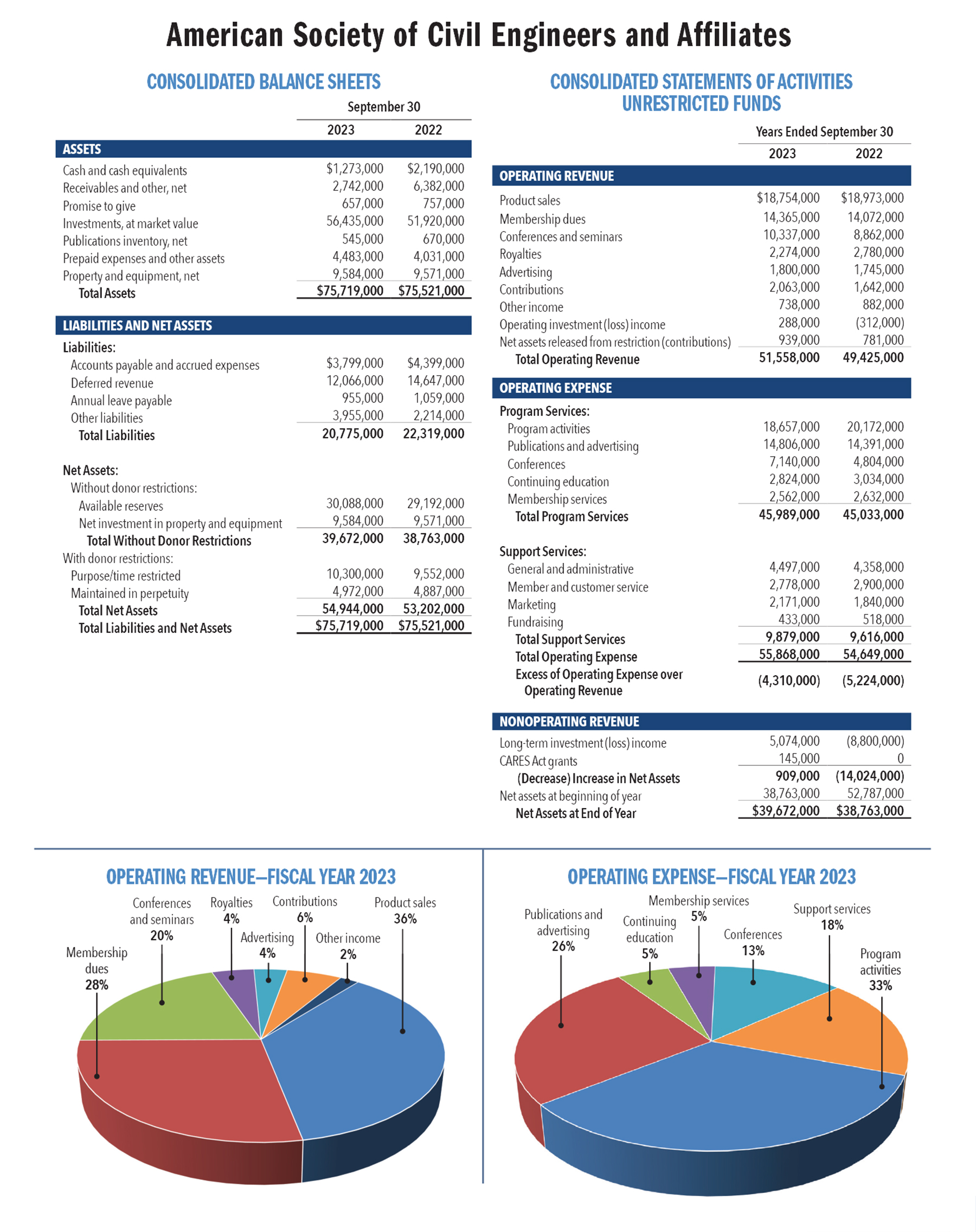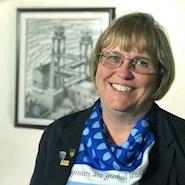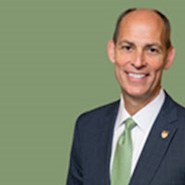
By Maria C. Lehman, P.E., NAC, ENV SP, F.ASCE, and Thomas W. Smith III, ENV SP, CAE, F.ASCE
It was a year of planning and transformation for ASCE, one focused on preparing civil engineers for what lies ahead and recognizing that the things we accomplish now will set the trajectory for the next 50 years.
Following extensive advocacy and public policy efforts, the 117th Congress passed a series of wins for ASCE’s top legislative priorities, including those related to the Water Resources Development Act, the FLOODS Act, the PRECIP Act, and the CHIPS and Science Act. Soon after, ASCE met with U.S. Secretary of Transportation Pete Buttigieg and special adviser Stephanie Pollack to discuss workforce development, implementation of the Infrastructure Investment and Jobs Act, and the benefits of the IIJA to communities across the country.
During the 2023 Infrastructure Week in May, we spoke at a summit featuring U.S. Secretary of Energy Jennifer Granholm and U.S. House Committee on Transportation and Infrastructure Chair Sam Graves. In August, we participated in a conversation with 37 of the nation’s state infrastructure coordinators at an event hosted by the National Governors Association, a key strategic partner with whom we also published the joint report: Strategies to Address Engineering Workforce Challenges.
We promoted the achievements of our member engineers, including organizing a series of Engineering and Public Works Roadshows in partnership with the American Council of Engineering Companies and the American Public Works Association. ASCE’s Outstanding Projects and Leaders Awards was highlighted on CBS Sunday Morning in a segment that heralded the event as the “Oscars of the engineering world.”
We advanced ASCE’s climate mitigation and adaptation efforts by publishing ASCE-NOAA Workshops on Leveraging Earth System Science and Modeling to Inform Civil Engineering Design, working with the National Oceanic and Atmospheric Administration to identify the climate products needed to support ASCE standards and manuals of practice. We completed the official G20 summit policy brief on climate and disaster-resilient infrastructure investment. And finally, we launched a first-of-its-kind cross-disciplinary standard, ASCE/COS 73-23: Standard Practice for Sustainable Infrastructure, which will guide infrastructure owners in how to develop and implement sustainable infrastructure solutions through a project’s entire life cycle.
To accelerate and amplify the development and adoption of future-ready codes and design standards, we established a dedicated standards development office and created a new standards website with interactive tools and exclusive features, firmly establishing ASCE as the premier resource for industry codes and standards. We released the report Pathways to Resilient Communities: Infrastructure Designed for the Environmental Hazards in Your Region. And we launched ASCE OPEN, our first multidisciplinary, open-access journal that recognizes that the infrastructure sector is becoming more cross disciplinary.
As we look to the future, we’ve reunited with MacGillivray Freeman Films for another giant-screen feature film, Cities of the Future, to be released during Engineers Week in February. Like Dream Big, Cities of the Future is part of a larger educational and public outreach program to help raise public awareness of the role of civil engineering and to celebrate civil engineers’ contributions to our communities.
The future looks bright — for our profession and ASCE! That’s thanks to the dedication and passion of members like you. As we enter a new year, we look forward to working together to shape the world for a better tomorrow.
Fiscal 2023 financial report
For fiscal year 2023, the Society and its affiliates had unrestricted operating revenues of $51.6 million and operating expenses of $55.9 million, with the Society funding expenses in excess of revenues by using earnings on our investment portfolio. Revenues have grown modestly, showing increases from conferences and seminars.
The Society continues to be in sound financial condition. Our policy of building and maintaining a reserve fund, which totaled $30.1 million at year-end 2023, is a key factor in our stable financial condition. The reserve fund has been built primarily from earnings on our long-term investment fund, which yielded $5.1 million in 2023 and lost $8.8 million in 2022 due to market declines.
The relationship between annual operating revenue and program expenses is a key long-term issue that the Board of Direction continues to address in order to maintain and preserve our continued strong financial condition while serving our members and leading the civil engineering profession to advance and protect the health, safety, and welfare of the public.

Maria C. Lehman, P.E., NAC, ENV SP, F.ASCE, was the ASCE 2023 president. Thomas W. Smith III, CAE, ENV SP, F.ASCE, is ASCE's executive director.
This report first appeared in the March/April 2024 issue of Civil Engineering.
View the ASCE By the Numbers infographic (JPG) (Zoom in on the graphic by holding down CTRL and clicking +/- or by holding down CTRL and using your mouse wheel).




